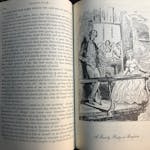Do we judge a book by the actions of its author? This perennial question came up most recently when the Nobel committee awarded the 2019 literature prize to Peter Handke, a German writer who denied the Srebrenica genocide.
It's a thorny question, and readers who responded to a recent Bookmark column (all men, interestingly) gave it serious thought. Most suggested that art should be separated from the artist.
"An achievement is an achievement, regardless of the character or behavior of the person who accomplishes it," wrote Harold Lieberman of St. Cloud.
"Charles Lindbergh deserves credit for his solo flight, despite the fact that he was so anti-Negro that he wouldn't even pat the heads of black children at an elementary school he was visiting. Henry Ford was profoundly and actively anti-Semitic, but he pioneered the assembly line and mass production."
Mark V. Anderson wrote: "It is a terrible thing to judge a book by the politics of its author. I want to read books that are enlightening in one area, even if the authors have terrible ideas in another area. As I recall, Isaac Newton had some really nutty ideas about the occult, but that didn't make his Laws of Motion less valid."
Richard Terrill quoted a line from my column: "Can we judge books in a vacuum, apart from the creator? Should we?" And then responded: "Should is best left out of the discussion. If what you know about a writer (she's arrogant, he's mistreated his children) makes it impossible for you to read a work without distraction, there's your answer. Others may react differently. There must never be a blacklist."
For critic Tobias Carroll, it's a matter of degree. "For what it's worth, I also think Handke's politics are extreme enough to counterbalance his work in a way that, say, Mario Vargas Llosa's aren't. (Alternately, one can be right-wing and not effectively be an apologist for genocide, I'd say.)"
Sam Schoephoerster of Circle Pines had a different view.
"Appreciating the output while ignoring the input is a mistake," he wrote. "The two are inextricably linked. The actions of the writer do, and should, color the view of the book. I struggle walking this fine line of evaluation every time a new headline is announced denouncing somebody."
Paul Stolen of Fosston, Minn., thought the question required more than a yes or no response.
"We in the West fall prey to this black-white thinking, when in fact there are continuums," he wrote. "The question itself is a dangerous slippery slope. Who are the judges, who are the censors, and what are they judging outside of the actual work of an author?"
When the author's political views seep into the prose, though, it can affect the book in a negative way, said Bart Berlin of Shoreview. "My primary example is 'Gone With the Wind,' " he wrote. "The author may not have had a conscious intention to glorify white racism but that is exactly what she did."
The question of art being judged apart from the artist was raised at Oscar Wilde's trial for homosexuality, points out Thomas Henry of North Mankato. "Because of an arbitrary and changeable societal prejudice against the man, his fine works were denigrated for a couple generations."
As Wilde himself wrote, Henry noted, "The artist is the creator of beautiful things. … There is no such thing as a moral or an immoral book. Books are well written, or badly written. That is all."
Agree? Disagree? Would love to hear from you. E-mail books@startribune.com.
Laurie Hertzel is the Star Tribune senior editor for books. On Twitter: @StribBooks. On Facebook: www.facebook.com/startribunebooks





